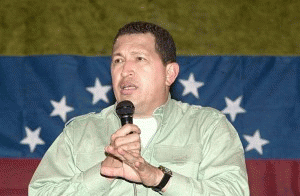Reprinted from Consortium News
The one common thread in modern U.S. foreign policy is an insistence on "free market" solutions to the world's problems. That is, unless you're lucky enough to live in a First World ally of the United States or your country is too big to bully.
So, if you're in France or Canada or -- for that matter -- China, you can have generous health and educational services and build a modern infrastructure. But if you're a Third World country or otherwise vulnerable -- like, say, Ukraine or Venezuela -- Official Washington insists that you shred your social safety net and give free reign to private investors.
Thus, in today's U.S. parlance, "democracy" has come to mean almost the opposite of what it classically meant. Rather than rule by a majority of the people, you have rule by "the market," which usually translates into rule by local oligarchs, rich foreigners and global banks.
Governments that don't follow these rules -- by instead shape their societies to address the needs of average citizens -- are deemed "not free," thus making them targets of U.S.-funded "non-governmental organizations," which train activists, pay journalists and coordinate business groups to organize an opposition to get rid of these "un-democratic" governments.
If a leader seeks to defend his or her nation's sovereignty by such means as requiring these NGOs to register as "foreign agents," the offending government is accused of violating "human rights" and becomes a candidate for more aggressive "regime change."
Currently, one of the big U.S. complaints against Russia is that it requires foreign-funded NGOs that seek to influence policy decisions to register as "foreign agents." The New York Times and other Western publications have cited this 2012 law as proof that Russia has become a dictatorship, while ignoring the fact that the Russians modeled their legislation after a U.S. law known as the "Foreign Agent Registration Act."
So, it's okay for the U.S. to label people who are paid by foreign entities to influence U.S. policies as "foreign agents" -- and to imprison people who fail to register -- but not for Russia to do the same. A number of these NGOs in Russia and elsewhere also are not "independent" entities but instead are financed by the U.S.-funded National Endowment for Democracy (NED) and the U.S. Agency for International Development.
There is even a circular element to this U.S. complaint. Leading the denunciation of Russia and other governments that restrain these U.S.-financed NGOs is Freedom House, which marks down countries on its "freedom index" when they balk at letting in this back-door U.S. influence. However, over the past three decades, Freedom House has become essentially a subsidiary of NED, a bought-and-paid-for NGO itself.
The Hidden CIA Hand
That takeover began in earnest in 1983 when CIA Director William Casey was focused on creating a funding mechanism to support Freedom House and other outside groups that would engage in propaganda and political action that the CIA had historically organized and financed covertly. Casey helped shape the plan for a congressionally funded entity that would serve as a conduit for this U.S. government money.
But Casey recognized the need to hide the CIA's strings. "Obviously we here [at CIA] should not get out front in the development of such an organization, nor should we appear to be a sponsor or advocate," Casey said in one undated letter to then-White House counselor Edwin Meese III -- as Casey urged creation of a "National Endowment." [See Consortiumnews.com's "CIA's Hidden Hand in 'Democracy' Groups."]
Casey's planning led to the 1983 creation of NED, which was put under the control of neoconservative Carl Gershman, who remains in charge to this day. Gershman's NED now distributes more than $100 million a year, which included financing scores of activists, journalists and other groups inside Ukraine before last year's coup and now pays for dozens of projects in Venezuela, the new emerging target for "regime change."
But NED's cash is only a part of how the U.S. government manipulates events in vulnerable countries. In Ukraine, prior to the February 2014 coup, neocon Assistant Secretary of State Victoria Nuland reminded Ukrainian business leaders that the United States had invested $5 billion in their "European aspirations."
Nuland then handpicked who would be the new leadership, telling U.S. Ambassador Geoffrey Pyatt that "Yats is the guy," referring to "free market" politician Arseniy Yatsenyuk, who not surprisingly emerged as the new prime minister after a violent coup ousted elected President Viktor Yanukovych on Feb. 22, 2014.
The coup also started a civil war that has claimed more than 6,000 lives, mostly ethnic Russians in eastern Ukraine who had supported Yanukovych and were targeted for a ruthless "anti-terrorist operation" spearheaded by neo-Nazi and other far-right militias dispatched by the U.S.-backed regime in Kiev. But Nuland blames everything on Russia's President Vladimir Putin. [See Consortiumnews.com's "Nuland's Mastery of Ukraine Propaganda."]
(Note: You can view every article as one long page if you sign up as an Advocate Member, or higher).






